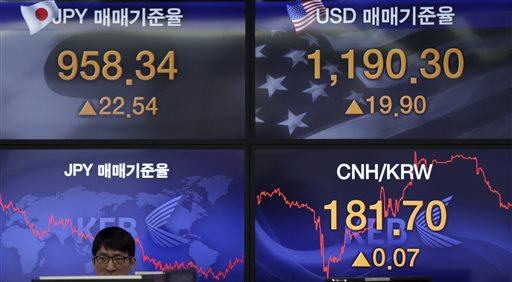
An employee is seated as screens showing foreign exchange rates are displayed at a bank in Seoul, South Korea, Thursday, Aug. 13, 2015. Most Asian share markets rallied Thursday and regional currencies gained after China reassured markets it would not allow the yuan to plummet after a surprise devaluation this week. AP
Hong Kong–Most Asian share markets rallied Thursday and regional currencies gained after China reassured markets it would not allow the yuan to plummet after a surprise devaluation this week.
The dollar inched higher, after taking a knock in New York from speculation the US Federal Reserve will delay hiking interest rates following China’s devaluation of the yuan.
Tokyo closed up 0.99 percent, or 202.78 points, to 20,595.55 and Sydney rose 0.11 percent, or 5.82 points, to 5,387.9.
Seoul gained 0.4 percent, or 7.99 points, to end at 1,983.46 after the South Korean central bank left its key rate at a record low.
Hong Kong’s benchmark Hang Seng Index added 0.43 percent, or 102.78 points, to end the day at 24,018.8 while Shanghai gained 1.76 percent, or 68.24 points, to 3,954.56.
China cut the reference point for the yuan against the dollar for the third consecutive day Thursday, reducing the rate by 1.1 percent from the previous session.
The cut, which was smaller than those in the previous two days, and news the central bank intervened to stabilize the yuan on Wednesday reassured dealers Beijing would not allow its currency to plummet.
People’s Bank of China assistant governor Zhang Xiaohui further supported markets Thursday when he said there is no basis for extended depreciation and the central bank can keep the yuan at an equilibrium.
“The PBOC has drawn a line in the sand and given verbal guidance to the market,” Eddie Cheung, a strategist at Standard Chartered in Shanghai, told Bloomberg News.
“If there are distortions, such as a very large gap between the onshore and offshore rates, the central bank will come in and stabilize the market.”
‘Investors are recovering’
Two previous cuts to the reference rate sparked concerns that China’s economy is weaker than previously thought and fears that a sharp fall in the yuan could spark a race to the bottom in forex markets.
The reductions came after China on Tuesday adopted a more market-oriented method of calculating the currency rate, widely seen as a devaluation, which sent ripples through global financial markets.
The reductions hit commodities along with stocks in Europe and Asia, boosting safe-havens gold and bonds, and prompting the worst two-day selloff in Asia-Pacific currencies since 1998.
The Indonesian rupiah, Philippine peso and South Korean won all gained against the dollar Thursday, as fears receded China could launch a currency war to make its exports more competitive.
A comeback on Wall Street the previous day, led by Apple and energy stocks, also cheered dealers in Asian equities.
“Investors are recovering from the last two days of panic,” Tommy Xie, an economist at Oversea-Chinese Banking Corp. in Singapore, told Bloomberg News.
In Tokyo the dollar traded at 124.57 yen, up from 124.24 yen in New York, where it took a hit on fears Beijing’s moves could delay a US interest rate hike.
In other trading, the euro changed hands at $1.1115 and 138.47 yen against $1.1159 and 138.63 yen in New York.
Oil prices gained Thursday, edging up from a six-year low in New York on news US oil supplies declined.
US benchmark West Texas Intermediate for September delivery hit $43.40. Brent crude for September gained 15 cents to $49.81.
Safe-haven gold fetched $1,117.34 compared to $1,117.50 late Wednesday.
In individual shares, Lenovo dropped 9.09 percent to HK$7.70 after the world’s biggest personal computer maker said first-quarter net profit more than halved, and announced it would cut around 3,200 staff.
Australia’s Telstra fell 2.24 percent to Aus$6.10 after the telecoms company said annual net profit dropped one percent to Aus$4.23 billion after the sale of Hong Kong mobile business CSL.
Mobile carrier SoftBank slumped 2.56 percent to 7,491 yen after US-listed Internet giant Alibaba, in which it holds a major stake, reported disappointing earnings.
In other markets:
— Mumbai settled marginally higher by 0.14 percent, or 37.27 points, at 27,549.53 points.
Mahindra & Mahindra rose 3.27 percent to 1,340.30 rupees, while miner Vedanta Limited fell 9.26 percent to 103.35 rupees.
— Bangkok dropped 0.30 percent, or 4.17 points, to 1,404.15
Oil company PTT fell 2.60 percent to 300 baht, while Bumrungrad Hospital, a popular medical tourism destination, rose 0.97 percent to 208 baht.
— Kuala Lumpur rose 0.73 percent, or 11.69 points, to close at 1,621.62.
Maybank added 2.26 percent to 8.60 ringgit, RHB Capital climbed 2.38 percent to 6.87 while Telekom Malaysia dipped 0.32 percent to 6.30 ringgit.
— Singapore closed 0.99 percent, or 30.29 points, higher at 3,091.78.
Singapore Telecom gained 2.31 percent to finish at Sg$3.98 after reporting that its first-quarter to June net profit rose 13 percent year on year to Sg$942 million ($676 million). DBS Bank rose 2.04 percent to Sg$19.02.
— Jakarta ended up 2.34 percent, or 104.76 points, at 4,584.25.
Investment company Kresna Graha Investama gained 17.65 percent to 1,000 rupiah, while financial service provider Wahana Ottomitra Multiartha fell 16.85 percent to 74 rupiah.
— Wellington lost 0.34 percent, or 19.51 points, to 5,737.70.
Spark New Zealand fell 1.44 percent at NZ$2.73 and Fletcher Building dropped 0.39 percent to NZ$7.61.
— Taipei closed down 0.34 percent, or 28.36 points, at 8,311.74.
TSMC fell 0.39 percent to close at Tw$128, while Cathay Financial Holdings dipped 0.11 percent to Tw$46.50.
— Manila dropped 0.74 percent, or 55.63 points, to 7,439.80.
Top-traded GT Capital was down 2.51 percent to 1,318 pesos, Universal Robina dipped 2.40 percent to 190.80 pesos while Banco de Oro was up 0.98 percent to 103 pesos.
First posted on Aug. 13, 2015 at 4:22 p.m.

